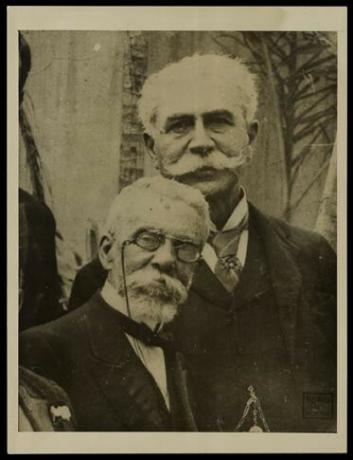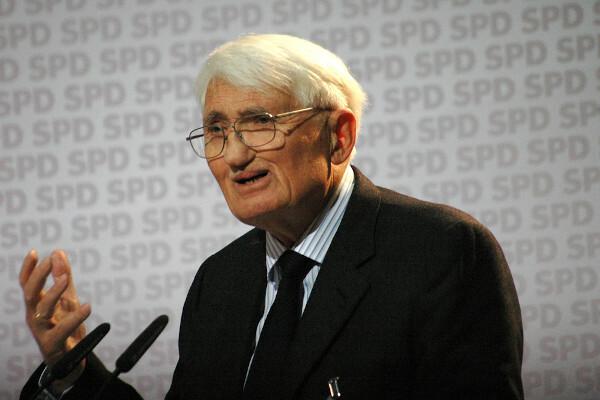Joaquim Maria Machado de Assis, better known as Machado de Assis, was the precursor of realism Brazilian and founder and president of Brazilian Academy of Letters, this being one of his greatest and most important achievements.
He published more than 200 short stories, 10 novels and other publications in various genres, such as serials, plays, short stories and chronicles, becoming a great reference as a chronicler of his time. The author witnessed historical events, such as the abolition of slavery and the passage of Brazil Empire for Brazil Republic.
Read too: Poems by Machado de Assis
Career

Machado de Assis and Joaquim Nabuco founded the Brazilian Academy of Letters (photo by Augusto Malta / National Library)
His career was marked by great deeds, chronicles one of them. Machado spoke a lot about the local society at the time, having over 40 years of observation and criticism of society, which resulted in the production of a total of more than 600 chronicles. While still alive, he managed to ascend socially, given that he was born from a humble family. He became a highly respected man, holding a variety of public positions. He was knighted and later an officer of the Order of the Rose.
The epileptic, stuttering writer and descendant of slaves, born on June 21, 1839 in Morro do Livramento, Rio de Janeiro, lived 69 years, dying in 1908. Machado de Assis is still considered the greatest Brazilian writer.
Biography
To check a detailed biographical analysis of Machado de Assis, we recommend reading this text: Biography of Machado de Assis.
Features
The author criticized several bourgeois values through ironies and metalanguages. Preceding not only realism itself, he established the realism psychological, clearly seen in his novels for making direct dialogues with the reader and also for specific thoughts that arise throughout the narrative as a reflection on the events that take place in the novel, similar to the breaking of the fourth wall in the theater, when the actor creates a direct dialogue with the viewer.
Machado often dealt with the social ascent and the maintenance of social appearances through criticism of the bourgeoisie, giving birth to Brazilian realism. His works, full of ironies, address what the author observed in society at the time. Rio de Janeiro do Brasil was going through a transition from lack of infrastructure, gaining based planning in the urbanism of Paris, France: sophistication to satisfy the prominent bourgeois portion of the population of the era. It is estimated that out of 200,000 Rio citizens, 100,000 were slaves and, of that total, only 20% were literate, making up a population in which 80% were illiterate.
His career can be divided into two phases, the first being characteristically more romantic, predominantly works such as his first novel, ‘Ressureição’; his first play, 'The Fall of Women for Fools'; and the book of poetry ‘Chrysalis’. THE romantic phase it lasted between 1864 and mid-1878.
Its second phase began with the publication of the book ‘The Posthumous Memoirs of Bras Cubas’, book written shortly after being hospitalized due to his epilepsy, which forced him to take strong medicines, which wore down his health. While still in hospital, he even sent some chapters of the novel to his wife, Carolina Augusta Xavier de Novais. As a milestone between one phase and another, it is clear that, in this new phase, Machado has strong traces of pessimism and irony, which become great features of the author's work, accompanying him to his last days.
Read too: Did Capitu betray Bentinho?
Construction
With a career full of publications of the most varied genres, Machado de Assis has published 10 novels, 10 plays, 200 short stories, 5 collections of poems and sonnets and over 600 chronicles. Examples are:
The poem 'She' (1855), his first published poem;
The comedy plays 'The Protocol' and 'The Way to the Door' (1863);
His first book of verse, 'Chrysalis' (1864);
His first novel, ‘Resurrection’ (1872);
The book of short stories 'Midnight Stories' (1873);
The novel ‘Iaiá Garcia’ (1878);
One of the most important books of his career: ‘Posthumous Memoirs of Brás Cubas’ (1881);
The novel ‘Quincas Borba’ (1891);
The novel ‘Dom Casmurro’ (1899);
The novel ‘Esau and Jacob’ (1904).
By M. Fernando Marinho
Source: Brazil School - https://brasilescola.uol.com.br/literatura/biografia-machado-assis.htm


